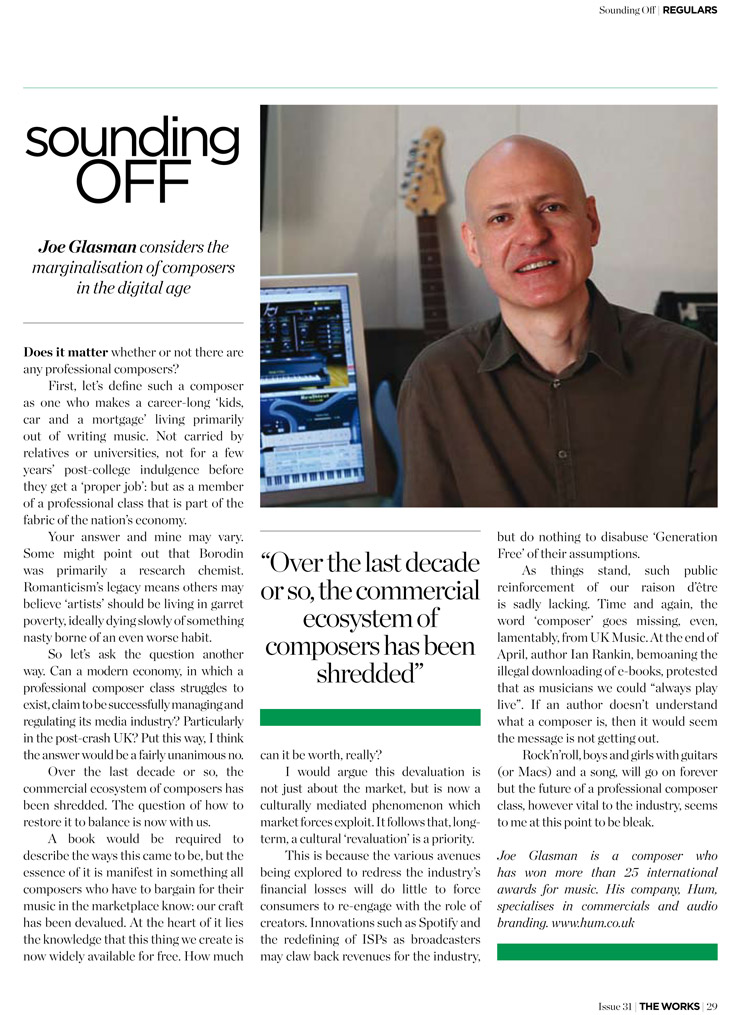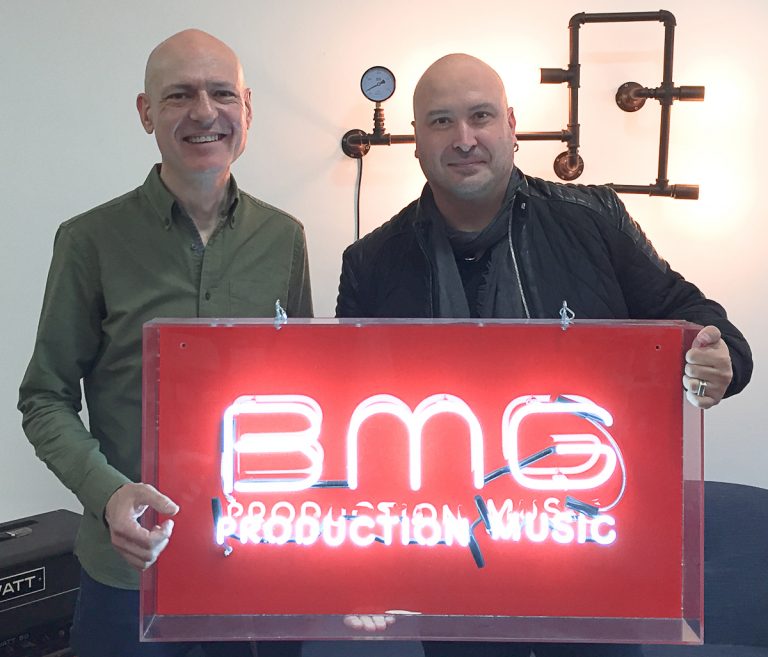This website uses cookies so that we can provide you with the best user experience possible. Cookie information is stored in your browser and performs functions such as recognising you when you return to our website and helping our team to understand which sections of the website you find most interesting and useful.
BASCA ‘The Works’ Magazine, May 2011

sounding OFF – Joe Glasman considers the marginalisation of composers in the digital age
Does it matter whether or not there are any professional composers?
First, let’s define such a composer as one who makes a career-long ‘kids, car and a mortgage’ living primarily out of writing music. Not carried by relatives or universities, not for a few years’ post-college indulgence before they get a ‘proper job’: but as a member of a professional class that is part of the fabric of the nation’s economy.
Your answer and mine may vary. Some might point out that Borodin was primarily a research chemist. Romanticism’s legacy means others may believe ‘artists’ should be living in garret poverty, ideally dying slowly of something nasty borne of an even worse habit.
So let’s ask the question another way. Can a modern economy, in which a professional composer class struggles to exist, claim to be successfully managing and regulating its media industry? Particularly in the post-crash UK? Put this way, I think the answer would be a fairly unanimous no.
Over the last decade or so, the commercial ecosystem of composers has been shredded. The question of how to restore it to balance is now with us.
A book would be required to describe the ways this came to be, but the essence of it is manifest in something all composers who have to bargain for their music in the marketplace know: our craft has been devalued. At the heart of it lies the knowledge that this thing we create is now widely available for free. How much can it be worth, really?
I would argue this devaluation is not just about the market, but is now a culturally mediated phenomenon which market forces exploit. It follows that, long-term, a cultural ‘revaluation’ is a priority.
This is because the various avenues being explored to redress the industry’s financial losses will do little to force consumers to re-engage with the role of creators. Innovations such as Spotify and the redefining of ISPs as broadcasters may claw back revenues for the industry, but do nothing to disabuse ‘Generation Free’ of their assumptions.
As things stand, such public reinforcement of our raison d’être is sadly lacking. Time and again, the word ‘composer’ goes missing, even, lamentably, from UK Music. At the end of April, author Ian Rankin, bemoaning the illegal downloading of e-books, protested that as musicians we could “always play live”. If an author doesn’t understand what a composer is, then it would seem the message is not getting out.
Rock’n’roll, boys and girls with guitars (or Macs) and a song, will go on forever but the future of a professional composer class, however vital to the industry, seems to me at this point to be bleak.
Joe Glasman is a composer who has won more than 25 international awards for music. His company, Hum, specialises in commercials and audio branding. www.hum.co.uk
-
Latest Posts
- Humtracks announces release of music video cut of Joe Glasman’s: ‘Can We Go There Again?’
- Humtracks releases video of Eva Katharina’s ‘Let You Go (A Farewell)’
- Hum Tracks soundtrack nominated for 2019 Mark Awards & Production Music Awards
- Hum Tracks signs global deal with BMG Production Music
- Hum Tracks June 2018 showreel: not just about the music, but who we are and how our catalogue works
Archive
- October 2019
- September 2019
- December 2018
- June 2018
- May 2018
- April 2018
- October 2017
- April 2017
- March 2017
- March 2015
- February 2015
- November 2014
- July 2014
- June 2014
- May 2014
- January 2014
- November 2013
- October 2013
- September 2013
- May 2013
- February 2012
- December 2011
- November 2011
- October 2011
- August 2011
- June 2011
- May 2011
- April 2010
- February 2009
- September 2008
- August 2008
- June 2008
- February 2008
- May 2007
- October 2006
- June 2006
- March 2006
- November 2005
LATEST NEWS
-
 Humtracks announces release of music video cut of Joe Glasman’s: ‘Can We Go There Again?’
17 October 2019
Humtracks announces release of music video cut of Joe Glasman’s: ‘Can We Go There Again?’
17 October 2019
-
 Humtracks releases video of Eva Katharina’s ‘Let You Go (A Farewell)’
4 October 2019
Humtracks releases video of Eva Katharina’s ‘Let You Go (A Farewell)’
4 October 2019
-
 Hum Tracks soundtrack nominated for 2019 Mark Awards & Production Music Awards
19 September 2019
Hum Tracks soundtrack nominated for 2019 Mark Awards & Production Music Awards
19 September 2019
-
 Hum Tracks signs global deal with BMG Production Music
17 December 2018
Hum Tracks signs global deal with BMG Production Music
17 December 2018
-
 Hum Tracks June 2018 showreel: not just about the music, but who we are and how our catalogue works
10 June 2018
Hum Tracks June 2018 showreel: not just about the music, but who we are and how our catalogue works
10 June 2018

